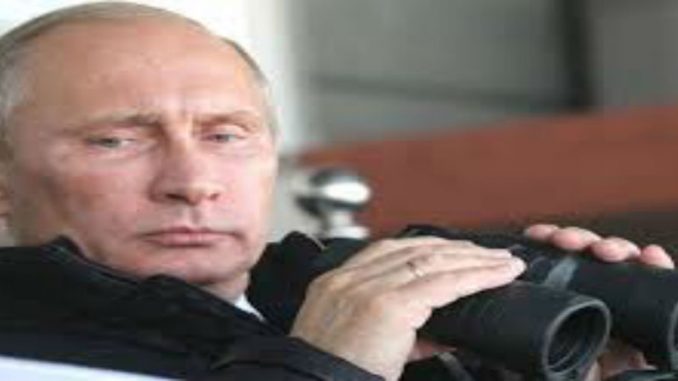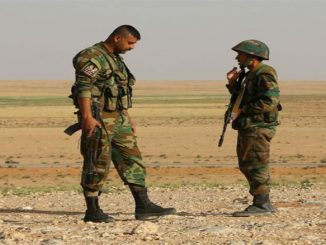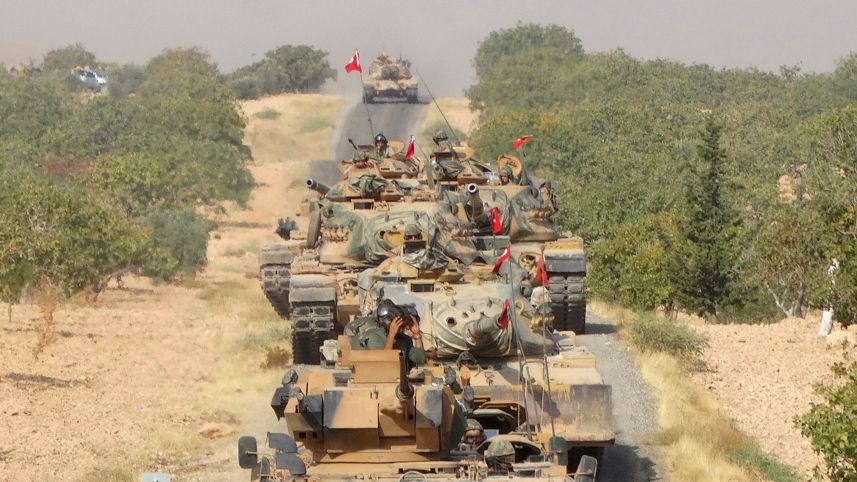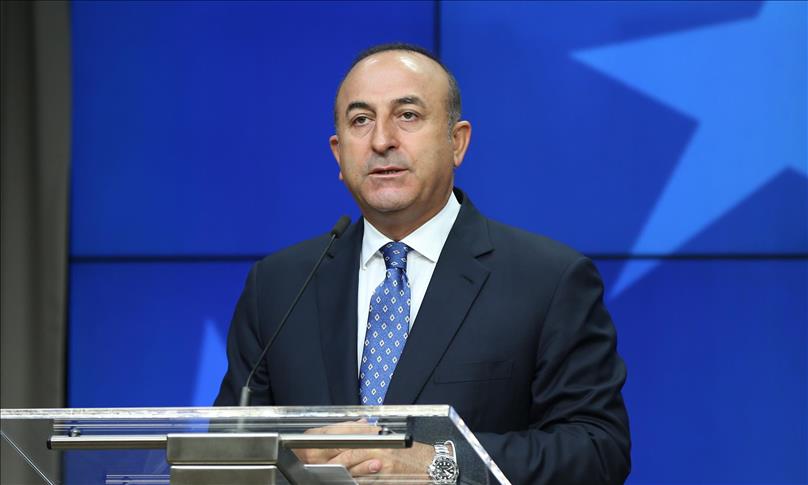
Russia is taking on the role of kingmaker in Libya by giving its backing to a renegade military officer as the future leader of the north African nation, complicating UN-led efforts to build a unity government.
Sunday Times has unveiled Russia’s role in Libya and considered Russia as the “kingmaker in Libya” as it supports General Khalifa Haftar to be the future leader of the North African nation, which is complicating the UN-led efforts to build a unity government.
Putin Wants To Correct His Mistakes In Libya
The British magazine stated that Moscow, which was emboldened by its military successes in Syria, has intervened into talks to end the civil war that erupted in Libya after the death of dictator Muammar Qaddafi in 2011.
However, the Russian President Vladimir Putin believes that his country was deceived by the UN resolution that authorized the NATO bombing campaign to topple Qaddafi.
“Qaddafi’s fall was all the more of a blow to the Kremlin because a year earlier it had signed a deal to establish a naval base in the eastern city of Benghazi,” according to the Sunday Times.
But the turmoil in Libya has given Putin the chance to find his way to interpret his previous plan.
Chaos in Libya Has Given Putin The chance To find His way Back
The associate director of the Royal United Services Institute, a British defense and security think tank, Jonathan Eyal, said,”The chaos in Libya represented an opportunity for Mr Putin to demonstrate that Moscow is essential to the resolution of conflicts and power struggles.”
Dr. Eyal also said,”Putin has a burning desire to erase the humiliation of Libya. Syria was a Launchpad for his narrative that Russia is a great power that cannot be ignored when resolving a crisis anywhere in the world.”
He added, “He has set out to make himself indispensable and is working hard to bargain with Donald Trump on Libya and elsewhere.”
Russia’s Deputy Foreign Minister Gennady Gatilov has delivered Russia’s declaration to support for General Khalifa Haftar(promoted by Tobruk’s House of Representatives (HoR) to Field Marshal last September), 73-years-old, a former exile turned military commander who controls the rump of Libya’s army.
Haftar is backed by Tobruk government based in eastern Libya that refuses to recognize the U.N.-backed government, enjoys the support of several Arab nations, including Egypt, the United Arab Emirates, and Jordan, as well as western countries as France.
In addition, Gatilov criticized harshly Martin Kobler, the UN envoy in Libya, for supporting Fayez al-Serraj, a wealthy Tripoli land owner, as head of a government of national accord(GNA).
On the other side, Russia demanded a leading role for Field Marshal Haftar, as Gatilov claimed that Haftar is “doing a lot to fight ISIS terrorists and help the government restore control of oil production.”
In fact, Haftar controls eastern Libya, using his air force and army to control the oilfields and mount offensives attacks against Islamist in Libya as he claimed they belong to “al-Qaeda and Islamic State-linked groups.”
In fact,al-Serraj’s UN-backed government failed to extend its power beyond the perimeter fencing of a naval base.
The GNA has been unable to win endorsement for a cabinet from a parliament based in the east of the country, as other power-brokers, as Egypt,UAE,and France,have continued to back a rival government as armed forces allied to them and under the command of Khalifa Haftar have made military gains on the ground.
Moreover, the although the GNA has gradually taken control of some ministries in Tripoli, but it has been unable to improve security or deal with a liquidity crisis, steep inflation, and a collapse in public healthcare provision.
At the same time, Tripoli self-declared government, that the GNA displaced, has tried recently to comeback amid the GNA minor developments.
The Presidential Council is made up of nine members who should represent different geographical regions and political currents within Libya.
The Council has been divided as two of its number mostly boycotting proceedings, and at the same time, different members regularly issuing contradictory statements.
Haftar: Russia Is Ready To End The Arms Embargo On Libya
Last week, Haftar said that he lobbied Putin to end the arms embargo the UN imposed on his forces when he visited Moscow early last month.
In this context, Haftar told an Italian newspaper Corriere Della Serra that “We were told that weapons can arrive only after the end of the embargo, and Putin is making efforts to cancel it.”
According to the Sunday Times,” In a symbolic gesture to his hosts, Field Marshal Haftar attended the Russian Foreign Ministry wearing a fur hat. ”
Haftar said,”I do not come cap in hand but with a Russian hat on my head.”
Last December, Khalifa Haftar has arrived in Moscow on an official visit to Russia for talks with Russian officials .
Haftar reportedly met with senior Russian officials including Defense Minister Sergei Shoigu and Foreign Minister Sergei Lavrov, as well as the Russian National Security Council
This was the second visit of Haftar to Russia since June when he met with Defense Minister Sergei Shoigu and Security Council Secretary Nikolai Patrushev.
Libya’s strongman Khalifa Haftar during his meeting with Russian Foreign Minister Sergey Lavrov said he was seeking Moscow’s help in his fight against “Islamist militants” at home.
Some recent media reports have been released at that time claiming that Russia may attempt to intervene militarily in Libya in support of the militia led by Khalifa Haftar.
“if Russian attempts succeeded, Russia will establish the second military air base in the Mediterranean, about 700 Km off Libya,” according to Debka, an Israeli intelligence news website, which also claimed that Russian President Vladimir Putin “is preparing to establish a naval air base off Benghazi coast, like Hmeimim base close to Latakia, in exchange for naval and air support to Haftar.”(which revives Russia’s former deal signed with Qaddafi before his fall to establish a naval base in the eastern city of Benghazi.)
After the election of Donald Trump, Putin said he is willing to expand the American-Russian cooperation in the war Daesh in Syria to Libya.
According to Debka, Russia is offering Haftar armaments of fighting jets, armored vehicles, and missiles.
According to the Russian proposal, the Russian planes will arrive directly to Libya from the Syrian Hmeimim, or from Russian aircraft carrier Admiral Kuznetsov that stationed now eastern of the Mediterranean. The aircraft carrier can sail from Syria to the center of Mediterranean and reposition off Benghazi. If such a plan was implemented, it would be the first time that Russian aircraft work in that part of the Mediterranean.
Libya: Another Point of Rapprochement between Egypt and Russia
According to the Sunday Times, Haftar has built close links to the Egyptian government since he returned to Libya six years ago. “Cairo is rumoured to keep his armouries resupplied,” said the Sunday Times.
Abdel Fattah al-Sisi is a former field marshal who launched a military coup in 2013, also enjoys good relations with the Kremlin.
The Egyptian Armed Forces assisted Haftar militarily and politically which in fact aligns with Russia’s policy in Libya.
Egypt’s forces have assisted Haftar in extending his power in the east. Moreover, Egypt’s Armed Forces have been mandated to protect the joint borders from the sea to the Libyan-Sudanese borders.
It is noteworthy that General Khalifa Haftar stated in a press release that the Egyptian army is the most responsible for protecting the eastern borders of Libya.
In addition, the military chief of staff of Haftar’s militias affiliated to the House of Representatives (HoR) in Tobruk, Abdul-Razeq Al-Nadhouri, confirmed that “we mandated the Egyptian leadership to protect the common borders from the Sea to the Libyan in North Sudanese boundaries in the South.”
Moreover, the Defense Ministry in the UN-backed government indicated that “foreign warplanes have played a key role in defeating Petroleum Facilities Guards forces,” reported by Libya Observer.
The Petroleum Facilities Guard (PFG) -led by Ibrahim Jadhran- have withdrawn from the Oil Crescent region in east Libya, hours after retaking Sidra and Ras Lanuf oil terminals from Haftar’s militia known as the Libyan National Army led (LNA).
Libya Observer cited local media which reported that the “PFG accused Egypt and the UAE of bombing their forces near the residential district of Ras Lanuf. Four PFG fighters were killed in the airstrikes.”
The Defense Minister-designate Al-Mihdi Al-Baraghati told Ajwa Net that “There are strong indications that the UAE and Egyptian warplanes bombed PFG forces in Ras Lanuf and Sidra, we are now making sure of these indications.”
The Libyan National Army (LNA) led by Haftar had taken over oil facilities in eastern Libya from Petroleum Facilities Guards, a rival militia force allied to the UN-backed government in the capital, Tripoli.
On the political level, Egypt hosted excessive Libyan visits last month which strongly indicated that Al-Sisi is trying to strengthen Haftar’s role in Libya especially by focusing on amending the PA article that outlined the authorities of the Libyan army chief commander and that also excluded Haftar from leading the army.
On December 13, 2016, Cairo hosted a conference attended by Libyan officials and representatives from the country’s numerous factions, where they issued a declaration of principles and five proposed amendments to an agreement, brokered by the UN in 2015.
The Libyan Political Agreement, signed in Skhirat, Morocco December 2015 known as the Skhirat Agreement, intensified the internal strife rather than resolving it.
The conference concluded an agreement on amending the 8th article of the 2015 agreement that outline the authorities of the Libyan army chief commander.
The article constituted a major obstacle during signing Skhirat agreement as it included the exclusion of General Khalifa Haftar from leading the army.
The conference meetings were brokered under the auspices of the Egypt’s General Intelligence Directorate and in a hotel related to the security entity.
In the end, it seems that Libya is another point of rapprochement between Egypt and Russia. In other words, if Russia is the “Kingmaker in Libya”, so Egypt is its arm there to facilitate and pave the road for Moscow to extend its power.



